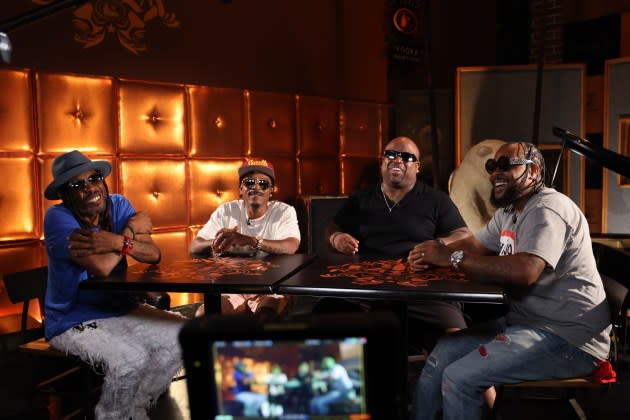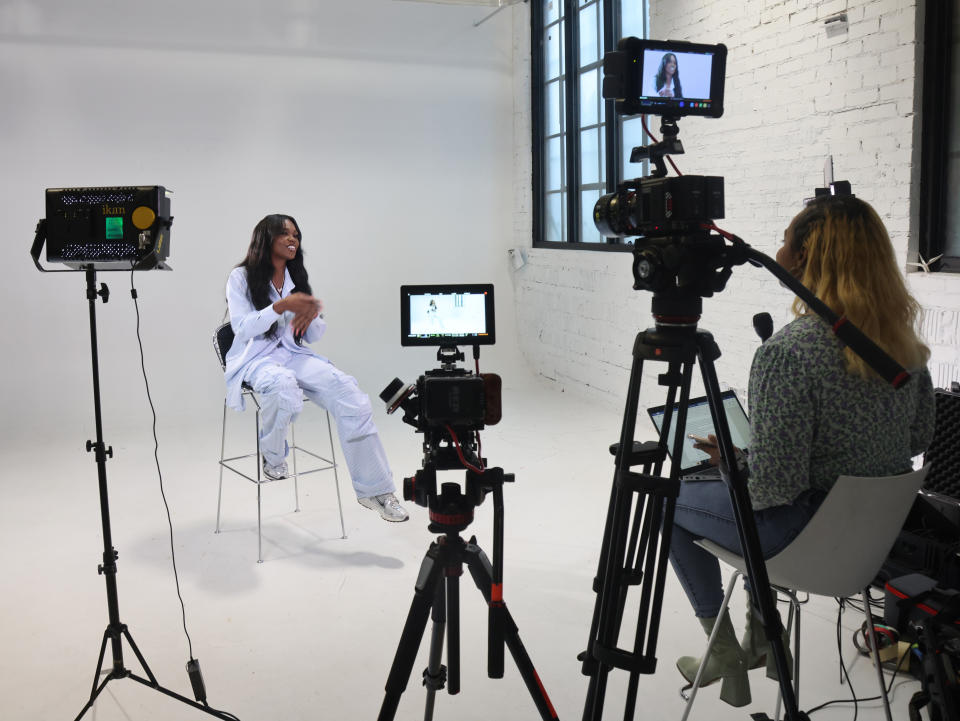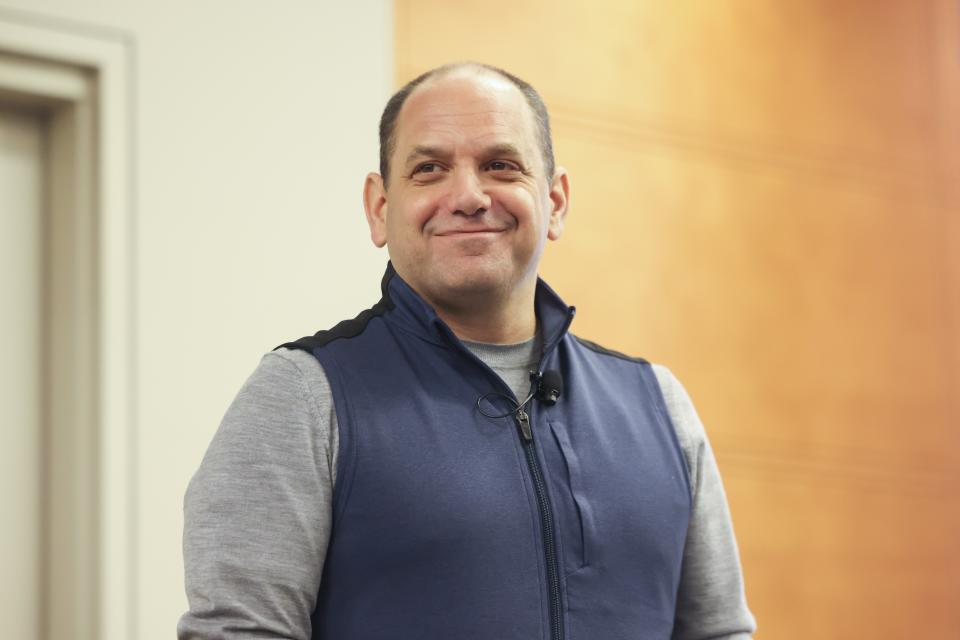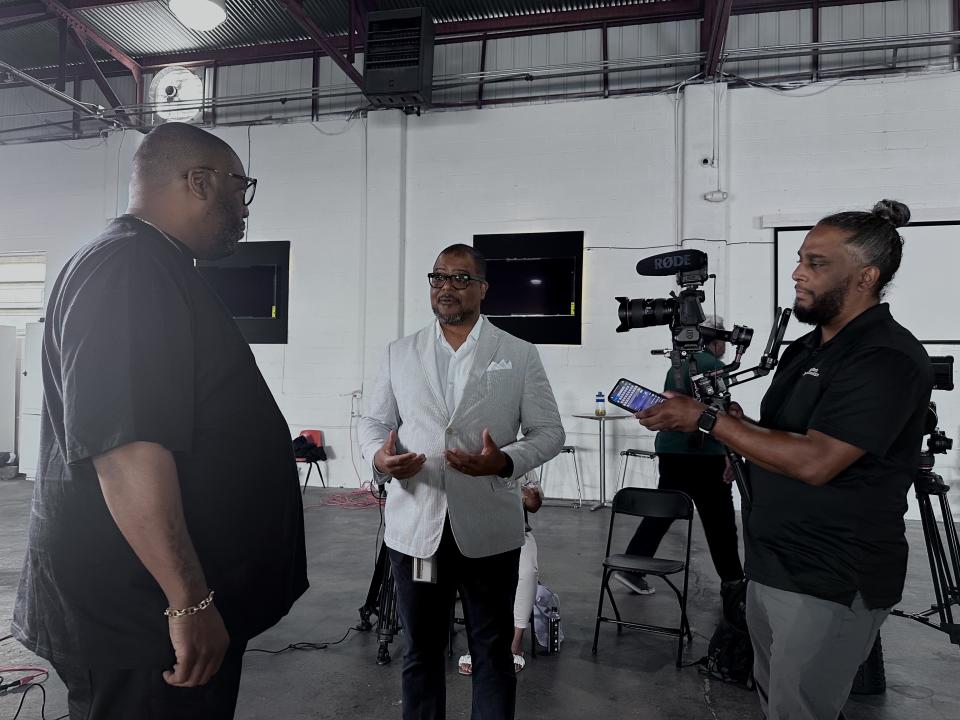Atlanta Journal-Constitution Hits The Big Screen: Publisher Andrew Morse On Paper’s New Hip-Hop Doc, CNN+ Lessons & The Grand Plan
- Oops!Something went wrong.Please try again later.

“As goes the South, goes the rest of the country,” Sen. Raphael Warnock, paraphrasing W.E.B. DuBois, said in The South Got Something to Say, the upcoming hip-hop documentary from the film division of the Atlanta Journal-Constitution.
Directed by Ryon and Tyson Horne, the first project from AJC Films examines the music genre’s role and power in Atlanta, the cultural capital of the South. Launching off the night in 1995 that Outkast won the best new artist at the Source Awards, the documentary includes conversations with Killer Mike, the legendary Goodie Mob, Silk Tymes Leather’s Jordan Victoria, rapper and Love & Hip Hop Atlanta star Rasheeda, Jermaine Dupri, journalist Sonia Murray, Atlanta Mayor Andre Dickens, former Mayor Andrew Young, Warnock and others.
More from Deadline

“This is more than just a music documentary,” AJC president and publisher Andrew Morse said of the film and the greater initiative the paper is undertaking. The former CNN+ chief said that that doc, which was filmed between April and September this year, is “really a documentary about Atlanta, because it’s really hard to look at the Atlanta today without looking at hip-hop and what an important part of this culture it is.”
Moving into the movie space, the Cox-owned AJC signed with Hollywood agency UTA this year for representation.
“Our relationship with AJC reflects the immense value we place on Atlanta, its artists and their stories,” UTA partner and Atlanta office boss Steve Cohen said of the burgeoning relationship. “We look forward to elevating AJC’s world-class storytelling in film and television and honor the creative legacy of this powerhouse of a city. I can’t think of a better way to launch AJC Films and to celebrate the essential contributions of Southern artists to 50 incredible years of hip hop than with The South Got Something to Say.
From his office at the AJC and its sweeping view of the Big Peach, Morse chatted with me about the motivation behind TSGSTS, the goals of AJC Films, why Atlanta matters and how what they are doing could be a blueprint for legacy papers nationwide.

DEADLINE: So why a documentary about hip-hop as your inaugural film?
ANDREW MORSE: So, we started thinking about doing this film because hip-hop is so important to Atlanta. It is. We started talking about what’s our angle on this, let’s do something and let’s do something important. The reason why we decided to do something to begin with is because it’s part of our new strategy is we relaunch the AJC and build the brand. We really want to connect to this dynamic and vibrant Black community in Atlanta. It’s hugely important to us for our strategy going forward. So, as we were working though potential topics, we looked at the anniversary and how hip-hop is so important to the city.
DEADLINE: …and, how important Atlanta hip-hop is to the country. I mean Killer Mike has one of the top albums in the nation right now…
MORSE: This is more than just a music documentary. It’s really a documentary about Atlanta because it’s really hard to look at the Atlanta today without looking at hip-hop and what an important part of this culture it is. It’s also really hard to look at hip-hop today and not see the influence of Atlanta.
I mean, it’s the sound that built the city. So, in order to be able to tell that story when you hear Senator Warnock talking, or you hear Mayor Dickens talking, it’s such an important part of their lives as Georgians. They’re able to broaden out the perspective and make it as much a story about the city as it is about music.
DEADLINE: In that, why this new arm of the paper now?
MORSE: We’ve established a pretty simple mission here.
Our intent is to transform the AJC from a 155-year-old newspaper into a modern media company, because truthfully, we don’t look at ourselves as a newspaper anymore. So, we’ve set a mission which is to be the most essential and engaging source of news for the people of Atlanta, Georgia, and the South. For us, everything we’re doing now is built around the mission of increasing our number of digital subscribers in Atlanta, Georgia and the South.
DEADLINE: Without putting words in your mouth, it sounds like you are talking about reaching out to Black audiences, Black markets?
MORSE: Yes.
The Black community in Atlanta drives so much nationwide, that we’re envisioning an entirely new digital product to be able to serve them. For instance, in order to be able to serve them like a modern media company, we’re ramping up our video efforts and our audio efforts.
DEADLINE: A sudden shift, no?
MORSE: Well, we’re not just we’re not just coming forward and saying we have this great idea. All of a sudden we’re filmmakers. We’re saying we know there are these audiences there that we have to reach.
DEADLINE: But reaching those audiences, in a time when traditional media outlets are struggling, that’s a big bet, don’t you think?
MORSE: We’re confident that we can build the right video and audio capabilities. And by the way, we’re sitting on 155 years of intellectual property to tell extraordinary stories of the city in this region. So yes, it’s a bit of a departure like all of a sudden. And I get it, the side glance …
DEADLINE: I wasn’t going to say it …
MORSE: I’m a TV guy, I’m that digital guy who’s publishing a newspaper. But Cox didn’t hire me to be a newspaper publisher. And I didn’t come here just to publish a newspaper, and I’m confident we can do this.
DEADLINE: Let’s talk about the support from Cox. They’ve taken a so-called hyper-local approach in choppy media waters…
MORSE: Yes.
DEADLINE: … so is what you and the Journal-Constitution are trying to do a pilot program for their larger chain?
MORSE: I’d say this: look at Georgia, look at Atlanta. We are at the center of every social debate this country has whether it is guns or whether it is abortion. Look at the critical role that this place plays in people’s lives — it is so important.
For me, I mean, my background is …I will always be a journalist. I’m a producer, I’m an executive, but I’m a journalist at heart. So, I think part of the reason why our team feels so good about where we are, and I think part of the reason why Cox is so supportive, is we feel so passionately about the journalistic mission. And, frankly, about the importance of local news.
We think we have a plan to be able to transform this organization. And by the way, if we can do that, it then provides a model for other local news organizations to follow and that that’s really important to Cox in general. Part of the reason they are so passionate about this is they care deeply about the importance of local news in people’s lives. So, if we can build a sustainable business model and transform the AJC, it creates a path that others can use too.
DEADLINE: You’re not the first to try…
MORSE: Not at all, but I believe fundamentally that there’s a playbook that we can follow to build really successful modern news organizations. I believe the New York Times crafted that playbook and have been executing it really well for the last 10 years. I think whether you are CNN or the New York Times or the Atlanta Journal-Constitution, the playbook is pretty similar, and the key is really knowing your audience, and then being able to create content and that serves the needs of specific audiences.
DEADLINE: I’m pretty sure you are limited in what you can say, but you mentioned CNN and obviously you ran the short-lived CNN+, before the current owners of Warner Bros Discovery pulled the plug after about a month. So, with that experience in your rearview mirror, aren’t you a bit jaded about intent and execution?
MORSE: (laughs) Dominic, the whole game and the power of digital media is the ability to identify specific audience targets, and super-serve them with the content that matters most to them. Full stop.
You don’t have to choose one audience anymore.
In the old days you had to broadcast or you printed a front page. And that was it. The beauty of a modern digital product is you can have a variety of anchors or categories, each of whom scratch a particular audience itch and each of which has millions of fans and followers, and you can super-serve those audiences. So, whether you are a cable network or whether you are a legacy newspaper, or whether you are startup digital company, the logic is the same: identify your audience, create world-class content in order to be able to serve them, and frankly lean into talent and personality in order to be able to attract fans and followers to it. That’s what we are doing here now.
DEADLINE: So, with the new film unit, with The South Got Something to Say, you clearly are thinking large, looking at past successes, learning from past let’s call them not so successful situations? Are we going to see Something to Say on Netflix later this year? Apple? Is that where you are taking this, literally and figuratively?
MORSE: Absolutely. We’re having conversations now with streamers and networks and I’m hoping that you know this one will have wide distribution. You know, this will be our calling card because we want everyone to know our intention is that we’re going to make great films. We want to work with every platform and every network.

DEADLINE: How’s that going?
MORSE: We’re working on it. We started having conversations early because this project came together relatively quickly. We’re going to have different windowing conversations. So, we’re having those conversations against an accelerated timeline.
DEADLINE: Not to speak ill of the dead, but it feels like you are looking to fill the void created by the demise of CNN Films, no?
MORSE: (laughs) I did not say that, you did — nor would I presume to do that, by the way.
In all seriousness, I mean, what they built with CNN Films is utterly extraordinary. They’ve shown a model for how a great brand with great talent and a great eye and great partnerships can produce world-class programming. We want to provide that ourselves within a certain window.
DEADLINE: So, will it live on your website or on another platform, like a streamer?
MORSE: I expect that some content will premiere on a streamer and we’ll bring it on to ajc.com. Afterwards, I would imagine in other cases, we’ll launch something on ajc.com, and then have it distributed downstream after that. It’ll be a variety of approaches because I think it comes down to each particular deal, each particular product.
DEADLINE: Building out like that, what is the plan in terms of trajectory? Is it one or two projects for Year 1, then three or four in Year 2?
MORSE: We’re starting to look at initial slate for next year. And we have about a half-dozen projects that we’re looking at now.
DEADLINE: Which are?
MORSE: Probably too early to go into detail but we’re looking to bring a number of them into development. We have a great guy named Jon Adler, who worked at CNN Films, who is consulting with AJC Films.. Jon has been working with us for about six months to go through our archive and identify really prospects for that first slate.
DEADLINE: And how many future projects has he identified?
MORSE: I hesitate to give you a number just because we haven’t lined it all up, but I’d like to produce between three and six next year. Ambitious projects that either we license, or potentially we take on one or two ourselves — dip our toe in the water. If we wind up with three great ones, then that’s terrific and we’ll build from there.
DEADLINE: You’ve mentioned the AJC archives a few times. So what files, so to speak, what slices of Atlanta history excite you?
MORSE: I think great nonfiction, and there are a couple different lanes there. There are larger-than-life characters that helped define Atlanta, whether that’s Hank Aaron, or whether it’s Andrew Young, or whether it’s Martin Luther King, Jimmy Carter. There’s so much in the history of this town.
Then again, with the beauty of a newspaper and a beauty of 155 years, once you start digging through the archives, remarkable stories emerge. There’s an incredible story of a an AJC editor who was kidnapped and held for ransom years ago. You know, there are great stories everywhere among us. So, I think you’ll see some in the sports realm, I think you’ll see some in the civil rights realm and the historical realm, and I think you’ll see some in the surprising and delightful realm of curiosity. We’ve got a lot going on.
Best of Deadline
SAG-AFTRA Interim Agreements: Full List Of Movies And TV Series
'Taylor Swift: The Eras Tour' Movie: Tickets, Release Dates, Premiere & Where To Watch
Sign up for Deadline's Newsletter. For the latest news, follow us on Facebook, Twitter, and Instagram.

